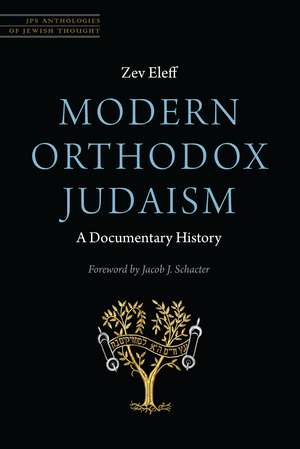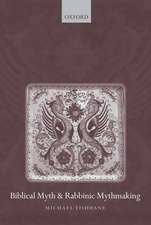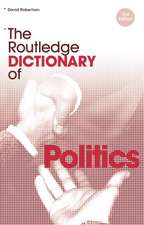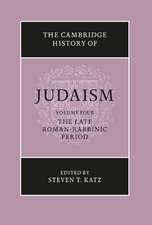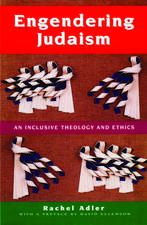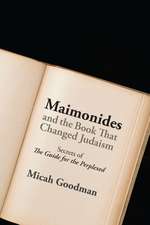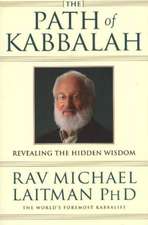Modern Orthodox Judaism: A Documentary History: JPS Anthologies of Jewish Thought
Autor Zev Eleff Cuvânt înainte de Dr. Jacob J Schacteren Limba Engleză Paperback – 30 iun 2016
Modern Orthodox Judaism offers an extensive selection of primary texts documenting the Orthodox encounter with American Judaism that led to the emergence of the Modern Orthodox movement. Many texts in this volume are drawn from episodes of conflict that helped form Modern Orthodox Judaism. These include the traditionalists’ response to the early expressions of Reform Judaism, as well as incidents that helped define the widening differences between Orthodox and Conservative Judaism in the early twentieth century. Other texts explore the internal struggles to maintain order and balance once Orthodox Judaism had separated itself from other religious movements.
Zev Eleff combines published documents with seldom-seen archival sources in tracing Modern Orthodoxy as it developed into a structured movement, established its own institutions, and encountered critical events and issues—some that helped shape the movement and others that caused tension within it. A general introduction explains the rise of the movement and puts the texts in historical context. Brief introductions to each section guide readers through the documents of this new, dynamic Jewish expression.
Zev Eleff combines published documents with seldom-seen archival sources in tracing Modern Orthodoxy as it developed into a structured movement, established its own institutions, and encountered critical events and issues—some that helped shape the movement and others that caused tension within it. A general introduction explains the rise of the movement and puts the texts in historical context. Brief introductions to each section guide readers through the documents of this new, dynamic Jewish expression.
Preț: 305.72 lei
Nou
Puncte Express: 459
Preț estimativ în valută:
58.50€ • 61.08$ • 48.31£
58.50€ • 61.08$ • 48.31£
Carte tipărită la comandă
Livrare economică 15-29 aprilie
Preluare comenzi: 021 569.72.76
Specificații
ISBN-13: 9780827612570
ISBN-10: 0827612575
Pagini: 570
Ilustrații: 16 images
Dimensiuni: 152 x 229 x 36 mm
Greutate: 0.82 kg
Editura: The Jewish Publication Society
Colecția The Jewish Publication Society
Seria JPS Anthologies of Jewish Thought
Locul publicării:United States
ISBN-10: 0827612575
Pagini: 570
Ilustrații: 16 images
Dimensiuni: 152 x 229 x 36 mm
Greutate: 0.82 kg
Editura: The Jewish Publication Society
Colecția The Jewish Publication Society
Seria JPS Anthologies of Jewish Thought
Locul publicării:United States
Notă biografică
Zev Eleff is the chief academic officer of the Hebrew Theological College, Chicago. He is the author of five books, including Living from Convention to Convention: A History of the NCSY, 1954–1980, and editor of Mentor of Generations: Reflections on Rabbi Joseph B. Soloveitchik. He has also authored more than thirty scholarly articles. Jacob J. Schacter is University Professor of Jewish History and Jewish Thought at Yeshiva University, New York.
Cuprins
List of Illustrations
Foreword
by Jacob J. Schacter
Preface
Acknowledgments
Part 1. Orthodox Judaism and the Modern American Experience
1. Engaging Reform
Introduction
Section 1: Charleston Clamorings and Other “Heresies”
“Retrograde Instead of Advancing”
Mordecai Noah (1825)
New Lights and Old Lights
A Member of the Reformed Society of Israelites (1825)
This Happy Land
Isaac Harby (1825)
A Jewish Luther
Jacob Mordecai (1826)
An Open Letter to Gustavus Poznanski
Isaac Leeser (1843)
“Some Wolves Clothed in Sheep’s-Cover”
Abraham Rice (1848)
What Prevails among the Jewish People?
Mordecai Noah (1850)
Section 2: Living Orthodox Judaism
This Is Religious Liberty in America
Abraham Kohn (1843)
Our Holy Place
Trustees of the Congregation Shearith Israel (1847)
Strange Misbehavior
Max Lilienthal (1854)
An Aunt’s Admonishment
Anna Marks Allen (1858)
Conclusion
2. The Traditional Talmud and Response to Reform Prayer Books
Introduction
Section 1: Talking Talmud
“The Talmud Is Not Divine” (1843)
Benjamin Cohen Carillon
At the Risk of Being Considered Hyper-orthodox (1843)
Henry Goldsmith
A Return to the Maimonidean View? (1844)
Abraham Rice
The Cleveland Conference (1855)
Isaac Leeser
It Is Decidedly Heretical (1856)
Morris J. Raphall
Section 2: The Modified Mahzor
An Ornament for Parlor-Tables (1855)
Bernard Illowy
A Letter from an “Enlightened Orthodox” Jew (1859)
Benjamin Franklin Peixotto
On Burning Reform Prayer Books (1865)
Eliyahu Holzman
Minhag Ashkenaz and Minhag Reform (1866)
Samuel Myer Isaacs
Conclusion
3. An Orthodox Ministry
Introduction
Section 1: The Impaired and Itinerant “Rabbi”
Rabbinic Tenure (1854)
Max Lilienthal
A New Calling (1862)
Palestine
Isaac Leeser’s Successor (1869)
Alfred T. Jones
Section 2: Defenders of Tradition
The Ethics (1885)
Alexander Kohut
Backward or Forward? (1885)
Kaufmann Kohler
What Is Progress? (1885)
Alexander Kohut
Section 3: An Orthodox Seminary?
To the Hebrews of America (1886)
Henry Pereira Mendes
A School for the Intelligent Orthodox (1887)
Sabato Morais
To Preserve Judaism Above All Else (1900)
Jacob H. Schiff
Conclusion
Part 2. The Contest for Modern Orthodox Judaism
4. The Arrival of Eastern European Immigrants
Introduction
Section 1: Resisting a Treifene Medine
Sabbath at the Polish Shul (1872)
William M. Rosenblatt
The Chief Rabbi’s Sermon (1888)
Abraham Cahan
The Charleston Responsum (1894)
Naftali Zvi Yehudah Berlin
Father and Mother (1890)
Anzia Yezierska
Daughter of the Ramaz (1893)
S. N. Behrman
The Bylaws of the Agudath Ha-Rabbonim (1902)
The Union of Orthodox Rabbis of America
Section 2: Accommodating to a Goldene Medine
The Orthodox Convention (1898)
Orthodox Jewish Congregational Union of America
What Is Orthodoxy? (1898)
Henry Pereira Mendes
Modern Orthodoxy in the Light of Orthodox Authorities (1898)
Gotthard Deutsch
Pictures of Jewish Home Life (1902)
Esther J. Ruskay
Young Israel (1913)
Hebrew Standard
Proposal for a Five-Day Work Week (1915)
Bernard Drachman
The Synagogue Council of America (1927)
Abraham Burstein
Conclusion
5. Trailblazers
Introduction
Section 1: The Revel Revolution
An Orthodox High School (1916)
Solomon T. H. Hurwitz
The Question of the Time (1926)
Eliezer Ladizinksy
Yeshiva College (1928)
Bernard Revel
The Hebrew Theological College of Chicago (1926)
Hyman L. Meites
Section 2: Solomon Schechter and the Orthodox
Is Schechter Orthodox? (1902)
Emanuel Schreiber
The “General Religious Tendency” of the Seminary (1902)
Solomon Schechter
A Dangerous Situation (1904)
American Hebrew
The Orthodox Rabbis and the Seminary (1904)
Judah David Eisenstein
A Reaffirmation of Traditional Judaism (1929)
Max Drob
Conclusion
6. The Parting of the Ways: Orthodox and Conservative Judaism
Introduction
Section 1: What’s in a Name?
A Definition of Modern Orthodox (1913)
Henry Pereira Mendes
The “Modern Orthodox” Rabbi (1928)
Solomon Zucrow
What Is Orthodox Judaism? (1930)
Leo Jung
The Rabbinical Council of America (1934)
Solomon Reichman
Orthodox–Traditional–Torah-True Judaism (1940)
Joseph Lookstein
Section 2: Mixed Seating and “Modern Orthodox”
“A Modern Orthodox Congregation” (1925)
Joseph Rudnick
May Men and Women Sit Together in Shul? (1954)
Joseph B. Soloveitchik
A “Family Seated” Orthodox Synagogue (1956)
Julius Katz
Section 3: Heresy Hunting
A New Religious Group in American Judaism? (1943)
S. Felix Mendelsohn
The Excommunication of Mordecai Kaplan (1945)
Agudath Ha-Rabbonim
The Conservative Beth Din (1954)
Fabian Schoenfeld
The Synagogue Council Ban (1956)
Eleven Roshei Yeshiva
A Conservative Converts to Orthodox Judaism (1958)
C. E. Hillel Kauvar
A Convert within Your Gates (1958)
Samson R. Weiss
Conclusion
Part 3. A Modern Orthodox Movement
7. Becoming Modern Orthodox Jews
Introduction
Section 1: The New Orthodox Left
The Search for a Modern Orthodox “Ideologist” (1965)
Charles S. Liebman
Making Orthodoxy Relevant in America (1966)
Irving “Yitz” Greenberg
Dear Yitzchak (1966)
Aharon Lichtenstein
The Radicals (1967)
Walter Wurzburger
Section 2: A Modern Orthodox Movement
The College Bowl Sensation (1963)
Yeshivah of Flatbush Student Government
Watching with Great Enthusiasm and Excitement (1963)
Fifth Graders of Hillel Day School
Modern Orthodoxy Is Not a Movement (1969)
Emanuel Rackman
A Modern Orthodox Movement (1969)
Norman Lamm
Conclusion
8. Orthodox, Inc.
Introduction
Section 1: The Day School
Maimonides School (1941)
Shulamith Meiselman
A Rabbinical Supervisory Council for Day Schools (1944)
Torah Umesorah
Orthodox Student Pride (1967)
Gwendolyn R. Buttnick
Section 2: Beyond the School
Camp Moshava (1945)
Lillian X. Frost
National Conference of Synagogue Youth (1956)
Abraham I. Rosenberg
Drisha Institute for Jewish Education (1980)
Soshea Leibler
Section 3: Yeshiva University
Synthesis (1944)
Samuel Belkin
A New Beginning (1978)
Yeshiva University Office of Admissions
Section 4: Industrializing Kashrut
The “OU” Symbol (1933)
Herbert S. Goldstein
How Kosher Is OU? (1958)
Alexander Rosenberg
Section 5: Interfaith Dialogue
The Self-Appointed Spokesman (1964)
National Council of Young Israel
Confrontation (1964)
Joseph B. Soloveitchik
The New Encounter (1967)
Irving “Yitz” Greenberg
Conclusion
9. The Orthodox Synagogue and Rabbinate
Introduction
Section 1: Rites of Passage
The Friday Night Bat Mitzvah (1944)
Oscar Z. Fasman
Fancy Parties and Busy Fathers (1961)
Joseph Speiser
Section 2: A More Orthodox Sanctuary?
Law Is Law (1952)
William N. Ciner
The Reacculturation of the “Yeshiva Student” (1960)
Ralph Pelcovitz
The Social Politics of Shul (1976)
Samuel C. Heilman
Section 3: The “New” Orthodox Rabbi
My Return to the Rabbinate (1968)
Anonymous
A Hero for the “Religiously Apathetic” (1972)
Steven “Shlomo” Riskin
Needed: Pastoral Training (1988)
Sherman P. Kirshner
Conclusion
10. The State of Orthodox Belief
Introduction
Section 1: What Does Orthodoxy Believe?
The Core of Judaism (1959)
Herman Wouk
Minimal Set of Principles (1961)
Leonard B. Gewirtz
The State of Orthodox Belief—An Open View (1966)
Marvin Fox
The State of Orthodox Belief—A Less-Open View (1966)
Immanuel Jakobovits
Section 2: Halakhah, the Modern Orthodox Way?
Halakhic Man and the Mathematician (1944)
Joseph B. Soloveitchik
Authentic Halakhah and the “Teleological Jurist” (1954)
Emanuel Rackman
The Letter and the Spirit of the Law (1962)
Immanuel Jakobovits
New York’s Most Powerful Rabbi? (1979)
Ronald I. Rubin
Conclusion
11. Responding to Tragedies and Triumphs
Introduction
Section 1: The Holocaust
Never Again! (1971)
Meir Kahane
The Voluntary Covenant (1982)
Irving Greenberg
Section 2: Zionism and the State of Israel
The Religious Zionist’s Responsibilities in “Galut” to “Eretz Israel” (1941)
Bessie Gotsfeld
A Few Words of Confession (1962)
Joseph B. Soloveitchik
An Expression of the “Jewish Soul” (1970)
Joel B. Wolowelsky
The Six-Day War (1973)
Eliezer Berkovits
Section 3: Communism, Vietnam, and Soviet Jewry
The Rosenberg Case (1953)
National Council of Young Israel
The Student Struggle for Soviet Jewry (1964)
Jacob Birnbaum
Rabbi Ahron Soloveichik’s Opposition to the Vietnam War (1968)
Kol Hamevaser
A Prayer for Soviet Jews (1981)
Haskel Lookstein
Conclusion
12. The Orthodox Family
Introduction
Section 1: Ritual Purity and Birth Control
Five Reasons Why Every Jewish Woman Should Adhere to Family Purity (1941)
Women’s Branch of the Union of Orthodox Jewish Congregations of America
Hedge of Roses (1966)
Norman Lamm
Commandment Number One: Birth Control (1959)
Herbert S. Goldstein
Section 2: Tay-Sachs: An Ashkenazic “Disease”
Tay-Sachs Disease (1973)
Allan Kaplan
An Official Policy for Genetic Screening (1973)
Association of Orthodox Jewish Scientists
The Pros and Cons of “Mass Hysteria” (1977)
Moshe D. Tendler
Section 3: The Prenuptial Agreement
Creativity in “Family Law” (1973)
Emanuel Rackman
In the Matter of Prenuptial Agreements (1993)
Rabbinical Council of America
Why Orthodox Rabbis Should Insist on a Prenuptial Agreement (1993)
Saul J. Berman
Conclusion
13. From Rebbetzin to Rabbah
Introduction
Section 1: The Rabbi’s Wife
The Rabbi’s Wife (1925)
Sara Hyamson
“My Occult Powers” (1947)
Channa Gerstein
The Role of the Rabbi’s Wife (1959)
Theodore L. Adams
A Rebbitzen Respectfully Dissents (1959)
Helen Felman
Section 2: A Female Synagogue Leader
Is Now the Time for Orthodox Women Rabbis? (1993)
Blu Greenberg
The Female “Congregational Educator” (1997)
Richard Kestenbaum
New Roles for Rebbetzins (1998)
Abby Lerner
Yes, We Are Orthodox, and Yes, We Hired a Female Member of Our Clergy! (2013)
Adam Scheier
Conclusion
14. Sliding to the Right and to the Left
Introduction
Section 1: The Center under Siege
An American Zionist Lives a “Schizoid Life” (1976)
David Landesman
A Modern Orthodox Utopia Turned to Ashes (1982)
David Singer
“Centrist Orthodoxy” (1984)
Gilbert Klaperman
Gifter Slaughters Lamm for Passover (1988)
Mordechai Gifter
Baruch Lanner Will Be Your Rabbi (1989)
Elie Hiller
“Frum from Birth” (1993)
Anonymous
Section 2: Sliding to the Right
An “Unorthodox” Ad? (1984)
Haskel Lookstein
The Misleading Salesmen of Torah u-Madda (1988)
Paul Eidelberg
Trashing Torah u-Madda (1988)
Behnam Dayanim and Dov Pinchot
The Israel Experience (1990)
Esther Krauss
“I Never Saw the Rav Read a Secular Book” (1993)
Abba Bronspiegel
Section 3: Sliding to the Left
Modern Orthodoxy Goes to Grossinger’s (1976)
Shlomo Riskin
The RIETS Responsum on Women’s Prayer Groups (1984)
Five Yeshiva University Roshei Yeshiva
The Affairs of the Rabbinical Council (1985)
Louis Bernstein
Piety Not Rebellion (1985)
Rivka Haut
“Very Little Halachic Judaism” (1985)
Eliezer Berkovits
“Modern Orthodox” and “Traditional Conservative”: Is an Alliance Possible? (1989)
Avi Weiss
Jewish Women Hear Muffled Voices (1990)
Laura Shaw
Take Rav Soloveitchik at Full Depth (1999)
Aharon Lichtenstein
Conclusion
15. Reconsidering Modern Orthodox Judaism in a New Century
Introduction
Section 1: Loosening Grip
Modern Orthodox Gedolim (2004)
Dena Freundlich
Stalemate at Stern College (2006)
Cindy Bernstein and Norman Lamm
Modern Orthodoxy’s Demise (2011)
Gary Bauman
Social Orthodoxy (2014)
Jay P. Lefkowitz
The Freundel Affair (2014)
Kesher Israel Board of Directors
Section 2: Modern Orthodoxy Reclaimed?
Open Orthodox Judaism (2003)
Dov Linzer and Avi Weiss
The Close of Edah (2006)
Saul J. Berman
Shirah Hadashah (2007)
Tova Hartman
A Statement of Principles (2010)
Nathaniel Helfgot
Taking Back Modern Orthodox Judaism (2014)
Asher Lopatin
Conclusion
Source Acknowledgments
Notes
Author’s Note on Sources
Index
Recenzii
"With the consistent integration of several points of view regarding many of the issues addressed, Modern Orthodox Judaism's readers are able to appreciate the complexity of these issues and the earnestness of purpose of those grappling with them."—Yaakov Bieler, Jewish Book Council
"Modern Orthodox Judaism stands an as an exemplary book and should be widely employed and consulted by scholars and students of American Judaism and American religion."—David Ellenson, American Jewish History
"An outstanding contribution to the study of our community."—Leonard Matanky, Jewish Action
"Modern Orthodox Judaism incorporates and annotates samplings of many of the most significant writings from the quills, pens, typewriters, word processors, computers, and ipads of the movers and shakers who articulated and shaped an ever-changing modern Orthodoxy, in each generation and into the future."—Aaron I. Reichel, Review of Rabbinic Judaism
"Eleff has provided a useful compendium for those interested in American Orthodoxy."—Samuel Heilman, American Jewish Archives Journal
"According to demographic projections, within two generations the majority of American Jews will be Orthodox, for the first time in nearly 150 years. How large a part of that community will be "modern"? And in what sense? In charting Modern Orthodoxy's past and present, Eleff has given us tools that may help us foresee its future."—Daniel Ross Goodman, Jewish Review of Books
"This valuable documentary history fills a real need for anyone interested in both the social and intellectual aspects of the Jewish religious movement known by many as Modern Orthodox Judaism. The volume shows sensitivity to the history of the movement and the dynamics of its change over time. It highlights public aspects of the movement as it responded to and participated in such epochal happenings as the Holocaust, the rise of Zionism, and the establishment of the State of Israel while not neglecting more internal questions of religious doctrine and practice such as the Jewish family and the role of feminism in traditionalist Judaism."—David B. Starr, Religious Studies Review
“This is an original volume with enduring value. . . . Even in fifty to one hundred years, anyone studying Modern Orthodoxy will want to have access to the sources reproduced in this work.”—Adam S. Ferziger, professor at Bar-Ilan University and author of Beyond Sectarianism: The Realignment of American Orthodox Judaism
“A pathbreaking documentary history of Modern Orthodoxy in America. There is nothing like it. The documents are well chosen and many will be new—even to scholars.”—Jonathan D. Sarna, Joseph H. and Belle R. Braun Professor of American Jewish History at Brandeis University
“Dr. Eleff’s volume enables readers to grapple with the complex issues of identity and ideology, religious practice and social behavior, rootedness in tradition and openness to new ways of thinking and acting that define Modern Orthodoxy.”—Jacob J. Schacter, University Professor of Jewish History and Jewish Thought at Yeshiva University
